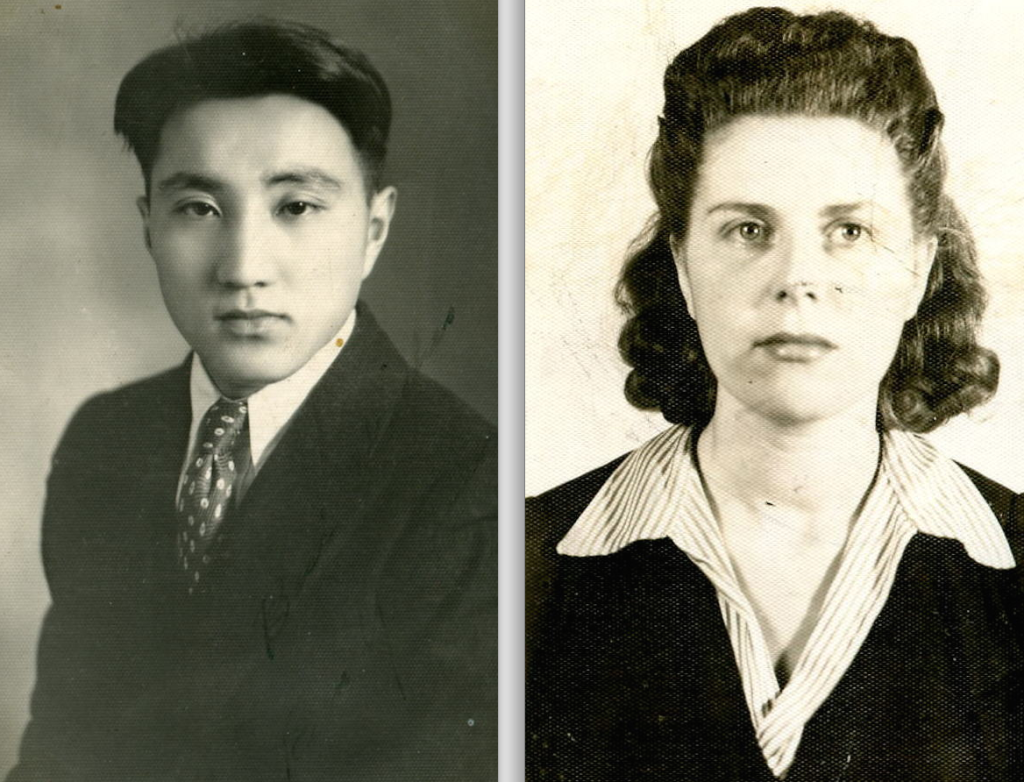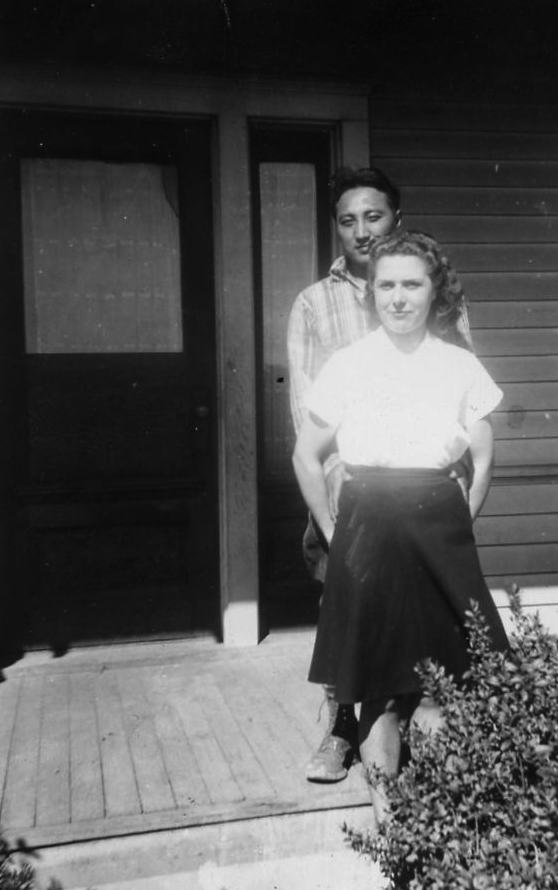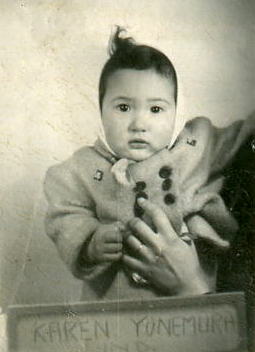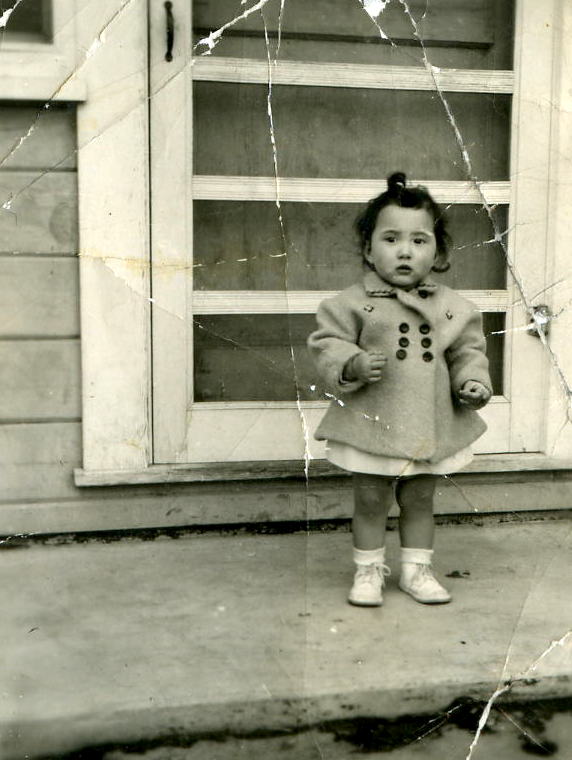Earlier this month, Karen Yonemura Ramirez reached out to us. She and her parents, Ben and Josie, were incarcerated at Minidoka and later lived in the Twin Falls, Idaho farm labor camp. Karen shared her story with us, along with several photographs. We have quoted her directly from our recent e-mail exchange.

“My mother was Caucasian, born in Spokane, WA. My father was full-blooded Japanese, born in Sumner, WA. They met each other when they were teens in Washington. My mother’s father cut and sold wood to people living in the Sumner area. My father’s family was one of his customers.”

“My parents got married in Vancouver, WA in 1939. My mother was pregnant with me when evacuation occurred and they were placed in the fairgrounds in Puyallup. My mother said they lived in the animal stalls with only sheets hung on clothesline wires to separate the families. She said it rained and it was so damp that grass began to grow between the wood slats in the stalls.”
“She went to Minidoka with my father. When they got to the camp they were shown a pile of wood and were told they had to make their own furniture. They took bed sheets and sewed them together and stuffed them with straw to make mattresses. There was a rumor that any children born in camp would not have U.S. citizenship and the rumor caused fear. So she, not being Japanese, was able to get out of camp and she returned to her family in Washington. I was born in the old general hospital in Puyallup. When I was three months old, she and I went by train to Idaho. We got off the train in Shoshone and we were escorted by a U.S. Army soldier who drove us out to the camp in a jeep.”

“My mother said that it was freezing cold in the winter, hot in the summer, and they had many dust storms. She said that the barracks had no insulation and the rats would get in and run around on the electrical wires. They had to go to the mess hall to eat their meals. They took their plates (they called them ‘dog dishes’) to the mess hall to get their food. She said she couldn’t stand the odor in the mess hall because they were served a lot of mutton and it had a very strong smell, so she would just get serving of rice and take it back to the barrack to eat.”
“While in camp, my father got a job picking up the garbage and driving it out to the dump. It was impossible for my mom to get canned milk for formula. My dad had a friend who was a cook in the mess hall and that friend would wrap cans of Carnation milk in paper bags and put it on top of the trash in one of the cans. When my dad got to the dump he would take the bag out of the can and take it back to the barrack so mom could make formula for me. They had to do what was necessary to survive.”

“We lived at the labor camp in Twin Falls after being released [from Minidoka]. My dad got a job on the Herman Kaster farm, which was about three-quarters of a mile from the labor camp. We lived at the labor camp, in a cottage, for a couple of years.”
![Karen Yonemura and her friend Hideo [last name unknown] at the Twin Falls farm labor camp, circa 1946-1947. Image courtesy of Karen Yonemura Ramirez.](http://www.uprootedexhibit.com/content/uploads/2015/06/Screen-Shot-2015-06-30-at-1.14.34-PM.png)
![Masami and Hideo [last name unknown] and Josie and Karen Yonemura at the Twin Falls farm labor camp, circa 1946-1947. Image courtesy of Karen Yonemura Ramirez.](http://www.uprootedexhibit.com/content/uploads/2015/06/Masami-Hideo-Josie-Karen-@-Labor-Camp-Twin-Falls-ID.jpg)
“The Kasters had a small house that we moved to and lived in for seventeen years. They treated us like family. The farm was 160 acres and my dad did most of the work while we lived there and raised sugar beets, wheat, alfalfa, pinto beans, and potatoes. There were several large feedlots and he fed several hundred steers during the winter. In the springtime the cattle was shipped out for slaughter.”
“Life was a bit difficult living in the Twin Falls area after the war. There was a lot of prejudice in that area at the time. My brother and I went to a parochial school and still experienced a lot of racial slurs and mistreatment there. On thing in particular that I remember is that a kid called me a ‘dirty Jap’ when I was in the second grade. I came from a very loving and happy home and had no idea that I was ‘different.’ I didn’t know what the kid meant by ‘dirty Jap.’ I went into the bathroom at school and looked in the mirror at my face, then at my hands and clothes to see if I looked dirty. When I got home that day, I asked my parents what that meant. They explained it to me and then I understood. I don’t hold any hard feelings or bitterness in my heart today because this happened, but I feel that it has made me a stronger, better person because of the experience. My parents never were bitter about what happened to them either. My dad would always say, ‘Well, it happened. It is in the past and now we must move forward.’ So that is what we did and I will always remember those words from him.”
“I think my parents’ story is very unique. They weathered through the hard times and prejudice and stayed married to each other for over forty-five years, until my mother passed away. We had a very happy home life and I had great parents. They never gave up hope or complained. They lost everything they had, started over again, and just moved forward.”
